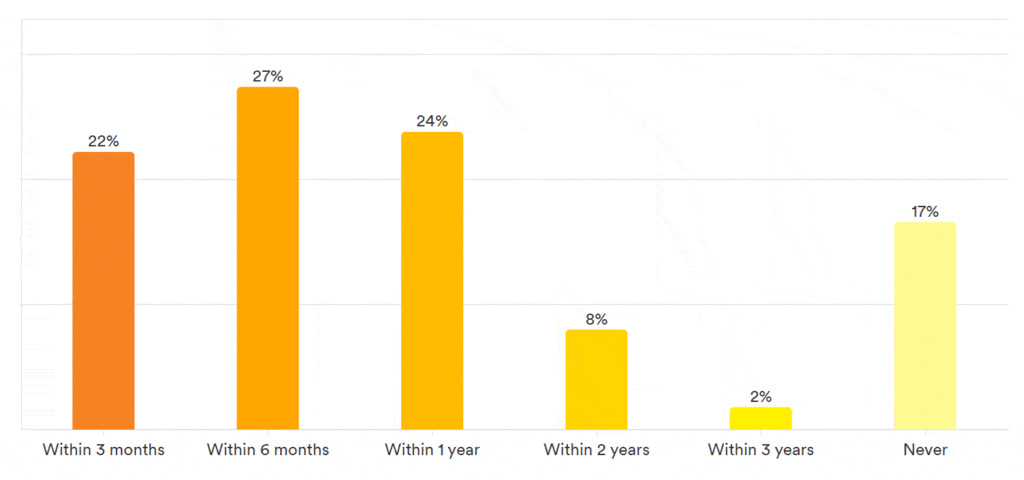According to the November LANDTHINK Pulse results, 27% of respondents believed that a slowing of home sales would negatively impact the land market with 6 months, followed closely by 24%, who said effects would be seen within one year, and 22% that said lagging home sales would take a toll on the land market within 3 months. What a difference just a few months can make. As 2022 draws to a close, soaring mortgage interest rates and inflation have thrown a bucket of ice-water on the super-heated housing market. Multiple factors-both existential and experiential- have contributed to the stall in home sales. The average rate on a 30-year fixed-rate mortgage was 6.31% for the week ending December 15, according to Freddie Mac. That’s more than double what most borrowers paid near the start of the pandemic. The Fed have raised rates this year at the fastest pace since the early 1980s, including by 0.75 point at each of their past four meetings to combat inflation. Those factors, combined with the fact that many would-be buyers have been priced out by high prices and rising mortgage rates, added further headwinds to buying. Inflated home prices have not fallen in kind. Sales have declined as both buyers and sellers wait for the other shoe to drop.
Last month, the November Pulse asked: How soon will a slowing of home sales negatively impact the land market?

Inflation is taking a larger chunk of prospective buyers’ income and the increased cost of borrowing is reducing their purchasing power. The slowdown in the housing market has been stunningly swift and with fears of a recession looming across the national landscape, the housing market appears to be firmly in correction territory. How much of a negative impact will slowing home sales have on the land market in the coming months?
We know that real estate is a major driver of the U.S. economy and the foundation of wealth building for the middle class. Purchasing or building a home remains an integral aspect of the American dream and it is the largest investment most Americans will make in their lifetime. Buying an existing home certainly impacts the economy, but new home starts cause a ripple effect throughout the economy and has a more direct impact on the land market.
When construction on a new home begins, more money is pumped into the economy and many industries are positively impacted, from the general contractor on down to the lumber mill that produced the two-by-fours used in framing. The work on the house creates new construction jobs, along with additional spending for construction supplies.
The timber industry is undoubtedly the largest benefactor of a vibrant housing market. The primary use of mature pine timber, or “saw timber” is lumber for construction. For land owners, the return on investment of owning land with merchantable saw timber is reduced when the housing market is in a slump, making timberland a less desirable investment.
The land market is generally a huge benefactor from developers and builders that purchase rural land. In most cases, developers purchase land to develop today and resell in the near future. The prices developers are willing to pay for raw land reflect what the developers can sell the property for in a year or two if they start developing now. When a slowdown continues for more than a few months, as many economists predict, developers will rein in any future land development.
When the economy is in a sustained downturn, more often than not it has a negative impact on your wallet, especially if you’re earning less than the median income. Often, that’s most apparent in your largest expense: your housing.
The 17% who said there would be NO negative impacts on the land market from slowing home sales, might be right. Buying a home or rural land in a recession can be a great thing if your personal finance conditions allow it. There are a lot of people out there that don’t need to borrow money to buy land. In the last three years, the land market has seen a large number of cash buyers.
Investors that prefer stability and control rethink stocks in an uncertain economy and look at safer, non-traditional ways to diversify their portfolio. Land real estate is usually the answer if they are in the market for a solid, long-term investment. Hard assets like timberland and farmland are a good hedge against both inflation and economic downturns and can provide a continuous cash flow from leases and timber income, as well as tax benefits. In the last two recessions, both outperformed the stock market. Land has historically shown appreciation in value. Most land buyers have long term goals and financial plans, and they understand the ups and downs that come with owning hard assets.
The results were all over the board, but the largest percentage (27%) believed that a slowing of home sales would negatively impact the land market within 6 months, followed closely by 24% who said negative impacts would be seen within one year, and 22% who said 3 months. Some (17%) thought there would be NO negative impacts on the land market. Only 8% said effects would be seen within 2 years, and just 2% said within 3 years.
Do you have a suggestion for next month’s Pulse question? Submit your question and we might choose yours!
This content may not be used or reproduced in any manner whatsoever, in part or in whole, without written permission of LANDTHINK. Use of this content without permission is a violation of federal copyright law. The articles, posts, comments, opinions and information provided by LANDTHINK are for informational and research purposes only and DOES NOT substitute or coincide with the advice of an attorney, accountant, real estate broker or any other licensed real estate professional. LANDTHINK strongly advises visitors and readers to seek their own professional guidance and advice related to buying, investing in or selling real estate.










Add Comment